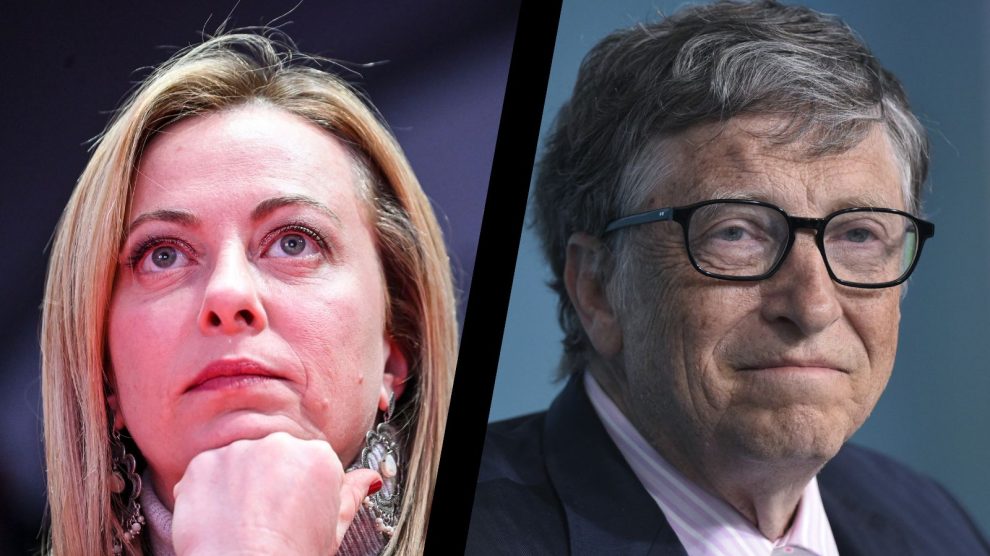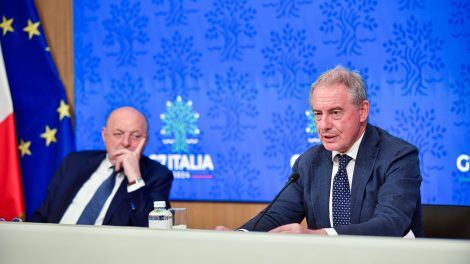AI is all people talk about. It’s the hot topic in Davos, where political and business elites examine its impact on global societies and economies. It’s also central to both Italy’s ongoing discourse and its chairmanship of the G-7. And it was the key theme explored by Italian Prime Minister Giorgia Meloni and Bill Gates during their one-hour talk on Thursday.
- The Microsoft founder and philanthropist is the latest wonk with which PM Meloni delved into the issue of AI. The list includes heavyweights such as LinkedIn’s Reid Hoffman, Tesla and SpaceX’s Elon Musk, and the late statesman Henry Kissinger.
- In an official note, the PM’s office said the meeting had also been a chance to underscore another key focus of the Italian G-7, i.e. the African continent, in view of the Italy-Africa Summit in late January.
The risk-opportunity spectrum. During their meeting, the two discussed the opportunities and risks of AI and the need to govern future changes so as to avoid being subjected to them, reads the note. Father Paolo Benanti (member of the United Nations AI Advisory Board), who also took part in the meeting, later told reporters that the American technologist had highlighted the risks, stressing the “importance of AI being in the right hands,” while also underscoring “the great advantages in the optimisation of some processes that may come” and noting that “different approaches are needed.”
The next industrial revolution. Over the past months, the Italian PM has repeatedly raised her concerns about AI’s impact on the labour market. She believes the technology’s potential impact on skilled work and breakneck advancement speed (which already exceeds the capacity of policymakers to keep up) might result in a significant loss of livelihood across societies.
- “We have seen something similar with globalisation, which has led to a verticalisation of wealth and an impoverishment of the middle class,” she said at the November AI Safety Summit in the United Kingdom.
- She also remarked on the potential for international friction as countries race to preserve and expand their AI-infused technological edge.
From Brussels to Rome to the G-7. The Italian government hailed the European Union’s agreement on the AI Act, a sweeping, risk-based draft law that will likely become a landmark regulation in the field. The European approach is also the anchor of the upcoming Italian national strategy on AI. Digital Undersecretary Alessio Butti told Il Foglio that the executive plans to unveil it in late January and said it will “certainly be useful to [the PM]’s effort to guide the G-7.”
- At the European level, Italian ministers have been reiterating the need for a simple and clear regulatory framework that balances technological progress and the protection of ethical principles and citizens’ rights.
- Rome has also indicated the need for international collaboration to ensure the emergence of effective regulation – “no country can do it alone,” as Minister Butti stressed – and vowed to work towards it in the framework of the G-7.
What of the business side? Mr Butti acknowledged that Italy’s suboptimal business environment is hampering the emergence of national AI champions and recalled the executive’s efforts to address this – such as its AI-centred fund for SMEs, which will kick off with a starting endowment of €600 million. Rome intends to lead by example by employing AI to overcome its own digital delay, as the undersecretary had explained in October.
- The strategy, he said, would have two chief objectives: “the broad dissemination of technologies among citizens and in public administrations” and “the protection of national interests, first and foremost by reducing dependence on third countries.”
- In PM Meloni’s own words, outlining a rulebook “does not mean working against companies” but rather “engaging in dialogue” with private stakeholders “in a world in which public and private interests, both legitimate, are not always overlapping and are sometimes at odds.”
Watch out for journalism. Father Benanti is also Chairman of the government’s AI Committee at the Department of Information and Publishing, which examines the impact of AI on the publishing industry and was recently audited by Parliament’s Committee overseeing Italy’s public broadcaster RAI. He highlighted the “fundamental” role of the journalist in nurturing public opinion and the functioning of democracy and warned that “radical tendencies” to rely on technology risk sidelining this professional figure.
- The expert also noted how the development of the digital economy and the growing importance of online platforms in disseminating news are endangering the money streams that sustain journalistic production.
- If the system “filters out any possibility of revenue, it is clear that the sector could be irreversibly damaged,” he warned.




